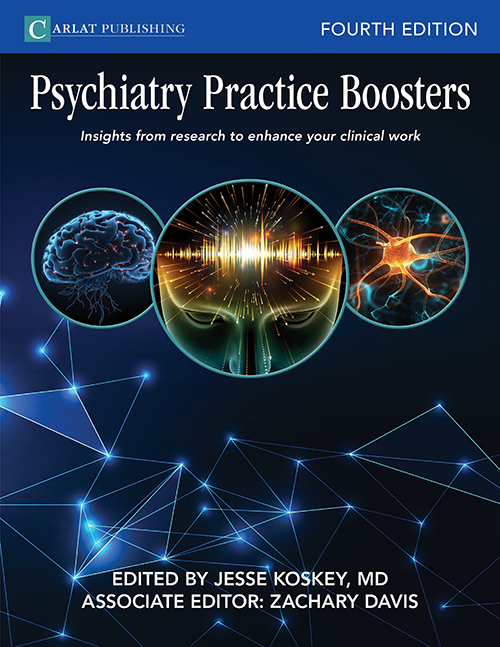Home » CBT vs Pharmacotherapy for Childhood Anxiety
CBT vs Pharmacotherapy for Childhood Anxiety
September 1, 2018
From The Carlat Child Psychiatry Report
Stephanie Fenwick, PharmD.
Dr. Fenwick has disclosed that she has no relevant financial or other interests in any commercial companies pertaining to this educational activity.
Review of: Wang Z et al, JAMA Pediatr 2017;171(11):1049–1056
Managing childhood anxiety can sometimes leave clinicians in a quandary. There is a paucity of evidence comparing different treatment approaches, and current guidelines on the subject are old and make inconsistent recommendations. To address this dilemma, researchers at the Mayo Clinic performed a systematic review and meta-analysis comparing pharmacotherapy with cognitive behavioral therapy (CBT) in children with anxiety disorders.
Investigators identified 115 studies with a total of 7,719 participants. All studies evaluated CBT, pharmacotherapy, or the combination of both for treatment of a diagnosed childhood anxiety disorder. The average participant age was 9.2 years (range 5.4 to 16.1), and slightly over half (55.6%) were female. Data were pooled using a random-effects meta-analysis.
Selective serotonin reuptake inhibitors (SSRIs) had significantly better outcomes than placebo for reduction in primary anxiety symptoms reported by parents or clinicians, as well as increased remission (relative risk [RR], 2.04) and response (RR, 1.96). Likewise, when compared with placebo, serotonin-norepinephrine reuptake inhibitors (SNRIs) also had a significantly greater reduction in clinician-reported primary anxiety symptoms. The use of tricyclic antidepressants or benzodiazepines was not associated with a significant improvement in anxiety symptoms.
Treatment with CBT compared with no therapy significantly improved primary anxiety symptoms reported by clinicians, parents, and children, as well as remission (RR, 4.08) and response (RR, 4.72). Moreover, combining CBT with an SSRI resulted in significantly better response rates than treatment with an SSRI alone.
Mild or moderate adverse effects were reported with medication use but not with CBT. However, none of the trials were large enough or long enough to evaluate suicide risk with SSRIs or SNRIs.
CCPR’s take
This study provides insight into optimal treatment strategies for children with anxiety disorders. SSRIs or CBT are both effective therapies; SNRIs may also be useful alternatives to SSRIs, although the evidence supporting their efficacy is less robust. This study also supports the premise that there is an added benefit in combining CBT with pharmacotherapy. However, the authors caution that more research is needed to evaluate the comparative effectiveness of therapies—specifically, head-to-head evaluations of medication and CBT.
Importantly, these results allow clinicians to offer patients and their families several options for effective treatment of childhood anxiety. For most patients, we would suggest that offering a choice between pharmacotherapy or CBT is the best approach, explaining the risks and benefits of both. This allows patient and family preferences to guide the development of a treatment plan.
Child PsychiatryManaging childhood anxiety can sometimes leave clinicians in a quandary. There is a paucity of evidence comparing different treatment approaches, and current guidelines on the subject are old and make inconsistent recommendations. To address this dilemma, researchers at the Mayo Clinic performed a systematic review and meta-analysis comparing pharmacotherapy with cognitive behavioral therapy (CBT) in children with anxiety disorders.
Investigators identified 115 studies with a total of 7,719 participants. All studies evaluated CBT, pharmacotherapy, or the combination of both for treatment of a diagnosed childhood anxiety disorder. The average participant age was 9.2 years (range 5.4 to 16.1), and slightly over half (55.6%) were female. Data were pooled using a random-effects meta-analysis.
Selective serotonin reuptake inhibitors (SSRIs) had significantly better outcomes than placebo for reduction in primary anxiety symptoms reported by parents or clinicians, as well as increased remission (relative risk [RR], 2.04) and response (RR, 1.96). Likewise, when compared with placebo, serotonin-norepinephrine reuptake inhibitors (SNRIs) also had a significantly greater reduction in clinician-reported primary anxiety symptoms. The use of tricyclic antidepressants or benzodiazepines was not associated with a significant improvement in anxiety symptoms.
Treatment with CBT compared with no therapy significantly improved primary anxiety symptoms reported by clinicians, parents, and children, as well as remission (RR, 4.08) and response (RR, 4.72). Moreover, combining CBT with an SSRI resulted in significantly better response rates than treatment with an SSRI alone.
Mild or moderate adverse effects were reported with medication use but not with CBT. However, none of the trials were large enough or long enough to evaluate suicide risk with SSRIs or SNRIs.
CCPR’s take
This study provides insight into optimal treatment strategies for children with anxiety disorders. SSRIs or CBT are both effective therapies; SNRIs may also be useful alternatives to SSRIs, although the evidence supporting their efficacy is less robust. This study also supports the premise that there is an added benefit in combining CBT with pharmacotherapy. However, the authors caution that more research is needed to evaluate the comparative effectiveness of therapies—specifically, head-to-head evaluations of medication and CBT.
Importantly, these results allow clinicians to offer patients and their families several options for effective treatment of childhood anxiety. For most patients, we would suggest that offering a choice between pharmacotherapy or CBT is the best approach, explaining the risks and benefits of both. This allows patient and family preferences to guide the development of a treatment plan.
KEYWORDS depressive_disorder research-update
Issue Date: September 1, 2018
Table Of Contents
Recommended
Newsletters
Please see our Terms and Conditions, Privacy Policy, Subscription Agreement, Use of Cookies, and Hardware/Software Requirements to view our website.
© 2025 Carlat Publishing, LLC and Affiliates, All Rights Reserved.


_-The-Breakthrough-Antipsychotic-That-Could-Change-Everything.jpg?1729528747)



